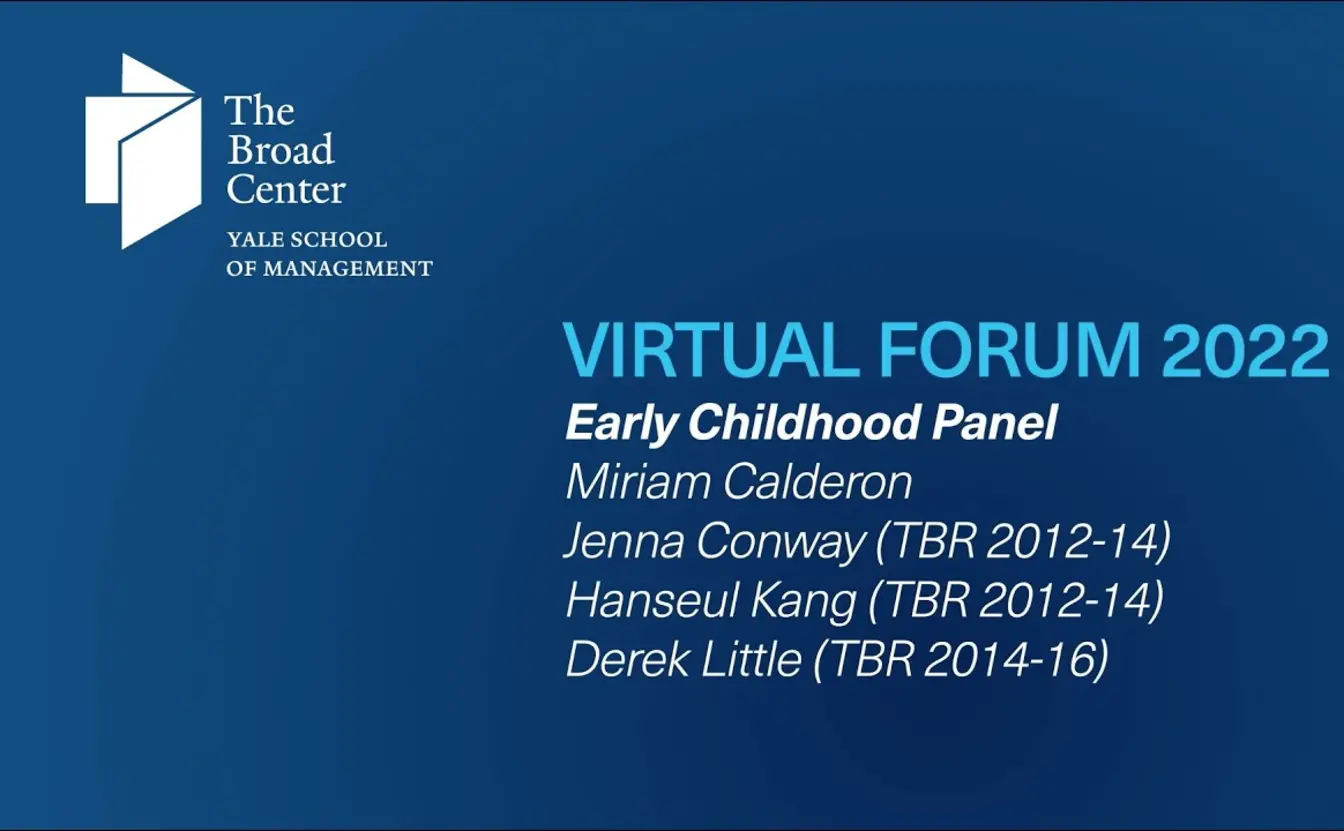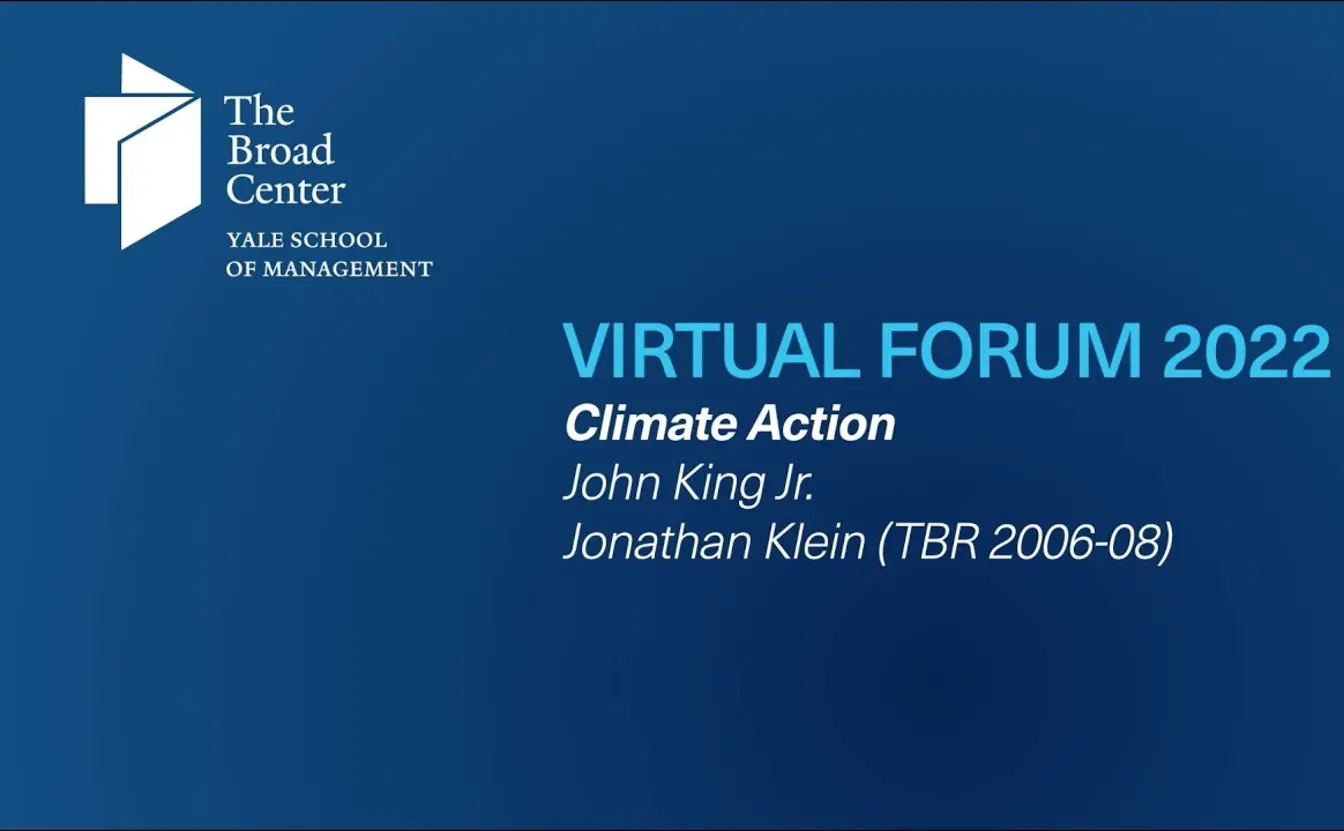
Broad Center Network Gathers for Virtual Forum
The day included cohort reunions, candid reflections from alumni, and discussions on teaching in prisons, early childhood education, and the climate crisis.
On March 31, more than 250 alumni of The Broad Center at the Yale School of Management (TBC at SOM) gathered for a day-long virtual Forum, the second hosted by the Yale School of Management, to share leadership stories, connect with friends and colleagues, and participate in conversations with leaders about pressing issues facing public education and the world. The theme of this year’s gathering was “Purpose. Connection. Power.”
Participants included the first cohort of Yale SOM’s Fellowship for Public Education Leadership (The Broad Fellowship), who completed the certificate program earlier this month; they gathered with alumni who graduated from The Broad Academy (TBA), The Broad Residency (TBR), and The Broad Fellowship for Education Leaders (TBFEL) at the previously independent Broad Center in Los Angeles over nearly two decades. The day’s events were accompanied by a robust discussion in the virtual event’s chat window, with alumni sharing relevant research and their personal experiences.
Learning Behind Bars
The event’s keynote discussion brought together three writers and lawyers with a deep interest in teaching and learning in prisons. The moderator was James Forman Jr., Yale’s J. Skelly Wright Professor of Law and the author of Locking Up Our Own: Crime and Punishment in Black America. Introducing Michelle Kuo and Dwayne Betts, he said, “You both live lives that are about teaching and reading and books in spaces that America has done its best to make sure teaching and reading can’t flourish… Teaching and reading in spaces of oppression.”
What difference can a teacher make? Forman asked. Kuo, the author of Reading with Patrick, a memoir about working as a tutor in a county jail in the Mississippi Delta, described coming to realize that her job was to help people in prison to discover their own taste in books. “I was still having this idea that I would fill them up with things that I loved and I realized instead that you really have to fill students up with themselves.”
Betts, a JD graduate of Yale Law School and currently a PhD student there, is a poet and the founding director of Freedom Reads, which brings books, libraries, and speakers to people in prison. “The best things that have happened to me is when I’ve rejected people’s notions that books don’t matter,” he said. “Every time I’ve made that the center of what I’ve been doing, I’ve been successful.”
Bringing books to prison often means contending with the idea that such programs must have measurable outcomes, Forman said. Kuo and Betts “didn’t talk about [reading’s] impact on recidivism and getting a job,” he said.
“We have no longitudinal studies trying to track the books we read and how it changed your life 20 years later,” Betts said. “No professor would oversee it, because how do you control for all of the other variables? It’s not as if anybody thinks that books are a panacea but I think that books are food and you feed people who are hungry.”
Kuo added, “They are intrinsically worthwhile. It matters for a person to read, to find comfort, to have their mind expanded.”
Reaching Out to Early Childhood Educators
The opening panel discussion focused on early childhood education, and its importance to the K-12 educators in the Broad network. Moderated by Jenna Conway (TBR 2012-14), chief school readiness officer for the Commonwealth of Virginia, it included Miriam Calderón, chief policy officer for the policy organization ZERO TO THREE; Derek Little (TBR 2012-14), deputy chief of teaching and learning in the Dallas Independent School District; and Hanseul Kang (TBR 2012-14), director of The Broad Center at Yale SOM and the former state superintendent of education for the District of Columbia.
“Why are we talking about early childhood?” Conway asked. “Why should this set of K-12 innovative leaders be thinking about babies?”
The first years of life are key to brain development and future health and well-being, Calderón said. “I fundamentally believe that we will not see the outcomes in the K-12 system, particularly when we talk about closing the persistent gaps and disparities by race, by income, by geography, if we do not have a more equitable early childhood system.”
Little echoed the importance of early childhood education in equity. In his urban district, he said, “The ceiling of outcome is our third-grade class. That third-grade result becomes a limiting factor in the long-term journeys of our students…. In our data, students who come through our pre-K program are three times as likely to be ready in third grade.”
K-12 educators can also learn a great deal from those in early childhood education, Kang said. “In the last few years, there’s been much more attention paid in the K-12 space to social-emotional learning. That’s something we could have come to a lot sooner if we had learned from our colleagues in the early childhood space.”
That means treating them with attention and respect, the panelists said. “Build relationships with the early childhood leaders in your community,” Calderón said.
“Partnership is not just about relationship and awareness,” Little added, “You can actually build implementation partnerships”; in Dallas, for example, public school teachers and coaches visit small childcare centers.
Calderón suggested that the pandemic has helped clarify shared goals. “In early childhood education, our orientation starts with the care and we are learning about the education and learning and development part,” she said. Meanwhile, K-12 systems are “coming out of the pandemic with a greater focus on helping families. Can we embrace across both of these systems—a care and education frame?”
Leading on Climate Change
A panel discussion on climate action was moderated by Jonathan Klein (TBR 2006-08), the co-founder and CEO of UndauntedK12, which supports schools in confronting the climate crisis. He spoke with John King Jr. ‘07, the former U.S. secretary of education and the co-chair of the Aspen Institute K12 Climate Action Commission, who is currently a candidate for governor in Maryland.
Klein recalled the day when he became focused on climate change. His daughter asked him to chaperone her participation in the climate strike of 2019. “I was radicalized that day, walking among young people, hearing their urgent, ambitious calls to action.”
“In today’s session, our hope is to raise awareness” of how climate change “is already changing our mission as educators.”
The K12 Climate Action Commission, King said, developed an action plan for K-12 education to help be part of solutions to climate change. “We looked at the education landscape and concluded that there’s so much more we can be doing on these issues,” he said. “We have 100,000 buildings. There are huge opportunities from an infrastructure standpoint for the education community to lead.”
Building sustainable infrastructure doesn’t divert money from teaching and learning, he said: “The per-square foot construction cost is the same, but over time the energy cost is dramatically lower.”
Why is this an important issue for schools to consider now, Klein asked, after two years of pandemic and other challenges?
“All of us have to acknowledge how hard the last couple of years have been, for educators, parents, kids,” King said. But “this is already a reality. This isn’t a 50-years-from-now problem. This is a now problem. Every time we replace the diesel bus with another diesel bus, we’re making our problem worse.”
A school district should start by developing a local climate action plan, King said. Bring students, parents, teachers “around the table to talk about what action steps we can concretely take. We have to be serious about targets. The targets have to be measurable and they have to be ambitious.”
It’s important to consider equity throughout the process. “We can’t have a serious conversation about climate action, about any subject, without bringing in a racial justice lens.”
The day also included cohort reunions, recognition of the inaugural Broad Fellowship cohort, highlights of alumni impact, and leadership stories—candid reflections by Broad alumni on their personal life experiences. Leadership Stories were presented by Steve Zrike (TBF 2021-22), Superintendent of Salem Public Schools (MA), and Dominique Donette (TBR 2018-20), Legislative and Public Affairs Specialist with the California Hawaii State Conference NAACP. Three important members of the Broad network were also recognized in memoriam in the opening session. The Broad community honored the lives of Eli Broad, LaVonne Sheffield (TBA 2002), and Quentin Liggins (TBR 2017-19), who passed away in the past year.
“It was inspiring and invigorating to be among so many members of the Broad network,” said Hanseul Kang, assistant dean and the Anita and Joshua Bekenstein ’80 B.A. Executive Director of The Broad Center at Yale SOM. “I am grateful to our amazing speakers, to the staff members from across SOM who helped make this event happen, and to all of the Broad alumni who joined throughout the day. We appreciate the incredible work our alumni community do all year on behalf of students, families, and communities, and look forward to continuing to come together for connection and insights through the Forum each year.”


